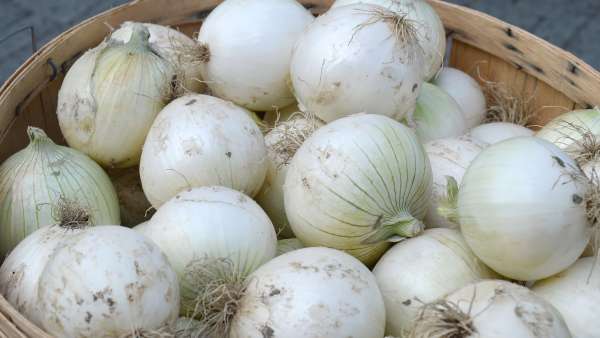White onion
White onion and its benefits

White onion is a vegetable often used in food, but very effective for treating colds and respiratory diseases, it is rich in vitamins A, B and C. A lot of natural recipes use white onion for various conditions and the results are excellent. White onion relieves sore throat, bronchitis, cough, lower cholesterol and blood sugar.
White onion is a slightly less known variety of onion than yellow onion.
The white onion has a more pronounced smell and the fact that we cry when we cut it makes us avoid it, especially if we are sensitive. It is a softer, sweeter and more fragrant onion.
Even though it has a pungent smell, this vegetable has a lot of benefits and properties that we should enjoy as much as possible. White onion is a dried onion with a sweet and fleshy core. Like red onion, it has a high sugar content and because of this the shelf life is very short, lasting about 2 days. Only if they are refrigerated can they last about a month.
Nutritional values of white onion (100g)
- Caloric intake: 40 kcal
- Carbohydrates (total): 9.34g
- Fiber (total): 1.7g
- Fructose (included in carbohydrates): 1.29g
- Carbohydrates/ sugars (total): 4.24 g
- Glucose / dextrose (included in carbohydrates): 1.97g
- Sucrose (included in carbohydrates): 0.99g
- Lipids / Fats (total): 0.1g
- Protein: 1.1g
Benefits of white onion
White onion have a number of benefits for the body, successfully coping with the competition of yellow and red onion. It has a more nuanced aroma than yellow or red onion, it has a high water content, it is very rich in vitamins A, B and C and it is also an important antioxidant. Protects the heart, is a natural probiotic, improves migraines and helps eliminate toxins from the body.
Many love the taste of onion, but few have the courage to consume it in any situation. Very few people know its health benefits. It is very rich in minerals, nutrients, vitamins, but also anti-inflammatory compounds.
Treating the cold with onion
A remedy can be prepared from the peel of ten onions in a liter of water, boiled for 15 minutes. Onion has miraculous properties against colds, especially accompanied by dry cough, laryngitis or asthma.
Lowering blood sugar
Consumption of white onion is beneficial for those suffering from diabetes.
Reducing blood cholesterol
Onion does not contain many calories, but they have a considerable amount of fiber, useful for intestinal transit. White onion lowers blood cholesterol levels, significantly reducing the risk of heart disease.
Treatment of cough and sore throat
For cough, take 1 potato, 1 onion and 1 raw apple; after washing them well, clean and add to a liter of water; boil them all until the water drops to almost half; 1 teaspoon of boiling water is consumed before each meal.
For sore throat you can prepare a tincture (take a teaspoon before each meal) and for external use prepare compresses with baked onion that are applied while hot.
For a simple cold, prepare the juice with honey (consume about 10 tablespoons of juice a day).
Another remedy is onion tincture with wine. To 1 liter of white wine add 50 ml. onion juice; for a week it is left to soak, strained, mixed and then consumed as a spoonful in the morning, at noon and in the evening. It is recommended to consume it about half an hour before a meal.
For a persistent cough, consume onion decoction sweetened with honey. It is not a very pleasant remedy to taste, some even can’t stand it, but it has extraordinary effects in calming cough attacks, in eliminating bronchial secretions and in restoring epithelia destroyed by respiratory infection.
To treat the flu, soak 4 onions for 24 hours in a liter of warm water; you can consume one cup between meals and another before bed. Sore throat can be treated with onion tincture. A teaspoon of tincture before each meal relieves sore throat.
Contraindications of white onion
Sensitive stomach, ulcer or gastritis prevent many people from enjoying the health benefits of white onion. In this case, it is recommended to use onion juice in various combinations and recipes, to reduce the burning effect of raw onion.
Did you know that onion...?
- is the most commonly used vegetable in the world;
- if it is harvested later, its antioxidant power is much higher;
- the outer layers of the onion have a richer content of antioxidants than the inner ones;
- those who eat raw onion every day will significantly reduce both the risk of stomach cancer and the breast cancer
- the smell of onion disappears with coffee
- the ancient Egyptians worshiped onion, considering that its shape and rings symbolize eternity;
- the unpleasant taste of onion can be eliminated by eating parsley;
- athletes in ancient Greece consumed large amounts of onion before competitions because they thought they balanced blood substances;
- in Rome, gladiators received an onion massage before a duel to develop their muscles;
- in the Middle Ages, people could pay their rent with onions; they often used it as a gift;
- thousands of years ago, onion was grown in Asia, but also in the Middle East.
Comments